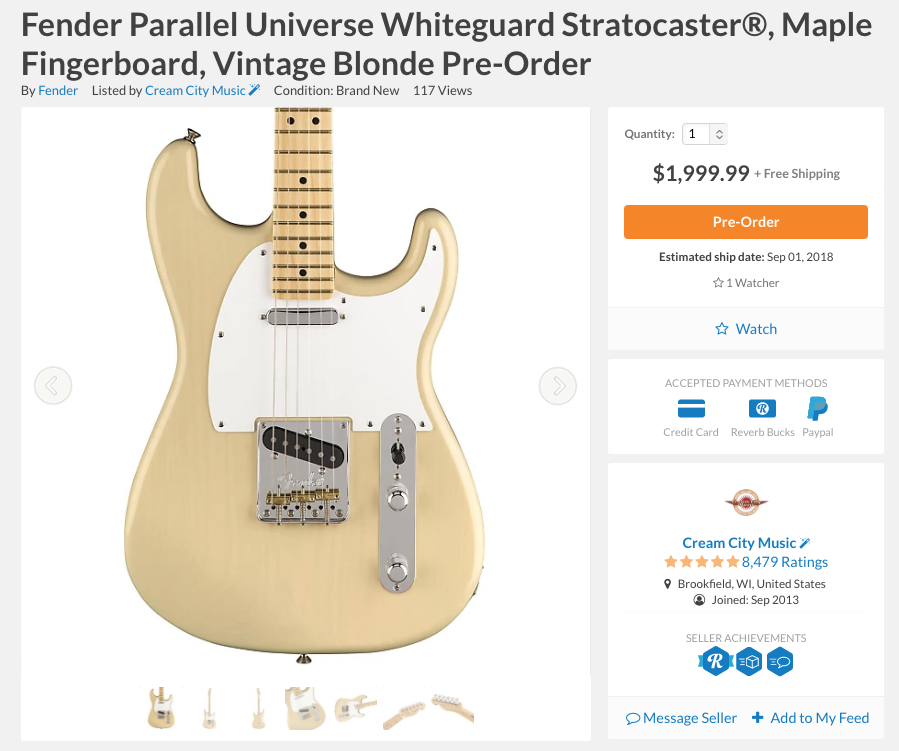Should Your Reverb Shop Accept Pre-Orders?
Pre-orders have steadily become more common in a variety of industries, with companies like Tesla and Apple often accepting them before official product release dates. Adding to that, too, is the popularity of fundraising platforms—like Kickstarter and Indiegogo—built around conditional pre-ordering and catering to smaller, independent creators and young startups.
Pre-ordering is something that sellers can also take advantage of on Reverb. Below, we're going to talk about how it works on the site, which will hopefully help you decide whether pre-orders are something that would be right for you and your shop.
If you have more questions about pre-ordering that aren't answered below, please leave them in the comments section.
What Are Pre-orders and Why Should I Use Them?
A pre-order is an order that a customer places for an item that has yet to be officially released and is promised to ship at a later date.
To the buyer, the process is like making a reservation—by ordering a yet-to-be-released item via pre-order, they're guaranteeing that they'll get what they're after when it is released, without having to worry about the product selling out before they've had a chance to purchase.
Pre-orders are also great for manufacturers and sellers who want to gauge demand for a product before investing a lot of time and/or money. If you're a builder selling on Reverb, for instance, pre-orders can be extra helpful in ensuring that you don't either underestimate demand and sell out too quickly or overestimate demand and end up stuck with too many units to move.
If you're an authorized dealer selling on Reverb, pre-orders can also be beneficial in helping inform your inventory investments and decisions. For example, Electro-Harmonix recently launched the new Big Muff Op Amp in conjunction with Billy Corgan, who came into the Reverb studio to demo it for us. After the demo was released and buzz around the pedal started to build, several sellers listed the pedal in their Reverb shops for pre-order. One seller reported that this led to a 300% spike in their order volume.
Pre-Orders Aren't Right For Everyone
Just because pre-orders can be very successful for some Reverb sellers, they're not right for everyone. If the pre-order function isn't properly managed from start to finish, you can find yourself left with a mess of unhappy customers and refund requests.
If you want to manage a successful pre-order campaign, we have two major pieces of advice:
Don't Oversell
Make sure that you set a reasonable ceiling for the number of pre-orders your shop can service. Taking orders for 300-plus units is great, just as long as you can service every single one. If you sell 300 and can only satisfy 100, you're going to be left processing refunds for a lot of unhappy buyers.
Overcommunicate
When a buyer places a pre-order with your shop, they're putting a lot of trust in you to deliver the product at what could be a much later date in some cases. Make sure that you honor their trust by keeping them updated every step of the way.
Let them know where they are in the pre-order queue and make sure to inform them of any potential delays to their order. It's always better to be the one to overcommunicate first, before your buyers have to request an update from you.
All In All...
Pre-orders can be a fantastic tool to drive sales and manage your costs, but executing a successful, valuable pre-order campaign requires a cool head and serious organization to maximize its value. If you're interested in setting up pre-orders for your own Reverb shop, please reach out to your account manager, who can help walk and talk you through the process.
